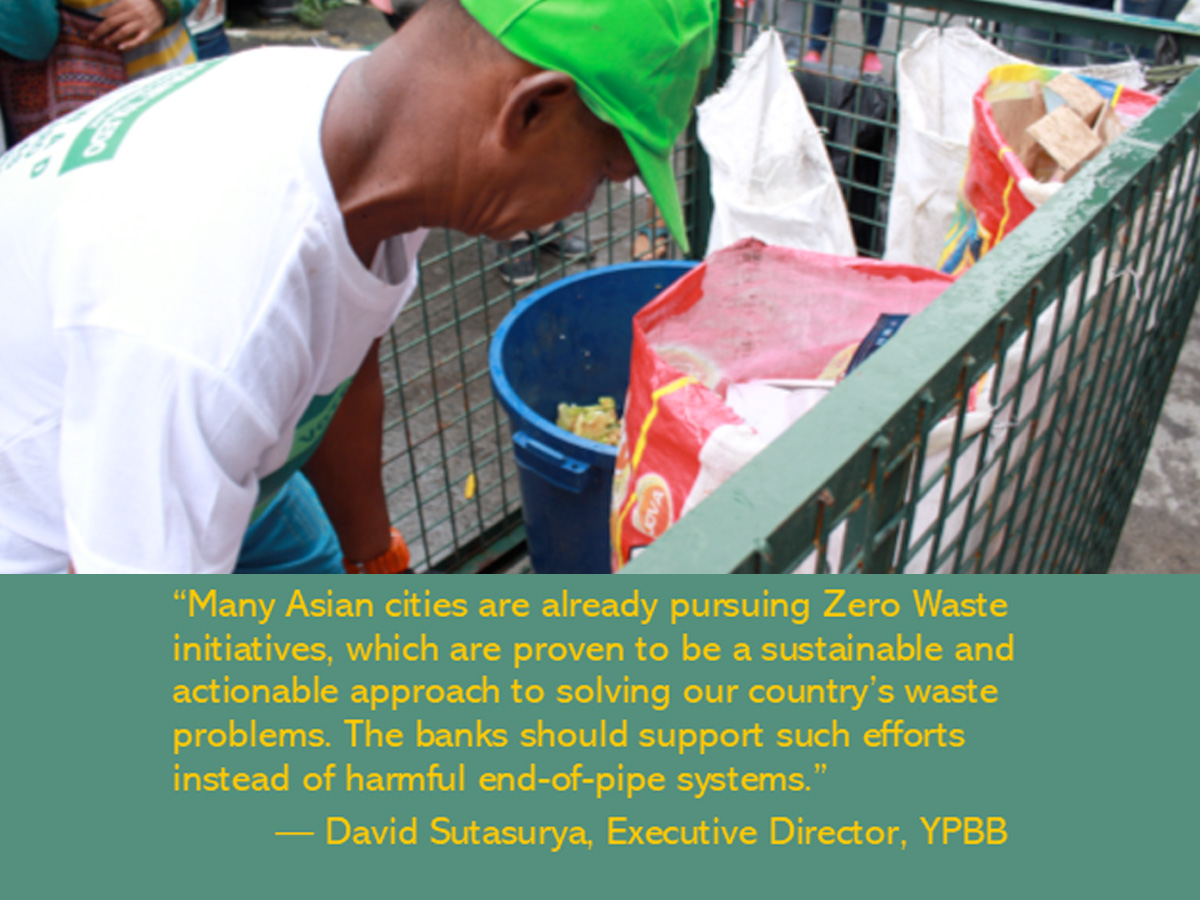Bali, Indonesia, 12 Oct 2018 — Today, over 400 organizations and individuals in more than 50 countries called on international financial institutions (IFIs) meeting this week in Bali, Indonesia, to stop funding waste incinerators, and instead prioritize projects that focus on Zero Waste solutions.
The call came ahead of the Global Infrastructure Forum on 13 October where 10 IFIs and the UN have organized a meeting to discuss their take on the world’s infrastructure agenda. Environmental groups are submitting a global petition to oppose the recent trend of so-called development financing that has seen the aggressive promotion of waste incinerators in the Global South.
“Although our country is hosting this year’s conference, we refuse to host an incineration plant that will maintain a linear economy and systematically destroy our nation’s precious resources,” says David Sutasurya, Executive Director of Yayasan Pekembangan Biosains dan Bioteknologi (YPBB). “Many Indonesian cities are already pursuing Zero Waste initiatives, which are proven to be a sustainable and actionable approach to solving our country’s waste problems. The banks should support such efforts instead of harmful end-of-pipe systems.”
A key focus of the forum is to mobilize partners’ financial resources to fund infrastructure projects for developing countries, particularly from the private sector.
Many concerned civil society groups are keeping a close and vigilant watch on IFIs because of the troubling legacy of negative environmental and social impacts their projects and policy advice have had on communities and citizens, particularly in the Global South. Many of these IFIs are funded by industrialized countries who wield a strong influence on the policies of poorer nations.
A key concern about the infrastructure financing of these banks are their focus on massive centralized waste incinerators or the so-called “waste-to-energy” facilities, which has had devastating consequences for the climate, human health, and local economies.
Many of these IFIs already funded or promoted waste incinerators in countries in the global South.
“Environmental justice groups around the world are asking development banks to stop funding incineration because it is bad for public health, bad for the environment, bad for the climate and bad for the economy, jeopardizing the livelihoods of millions of waste pickers around the world,” says Niven Reddy, Regional Coordinator for GAIA Africa. “Incineration has proven to be a failed model in the Global North and should not be peddled in the Global South.”
In Europe, the EU has put another nail in the coffin for incinerators: the waste legislation implementation report published by the EC last month instructed countries to introduce measures to phase out residual waste treatment including, among others, incineration. Joan Marc Simon, Executive Director of Zero Waste Europe states, “Support for Incineration is fading and it is agreed that it is not part of the Circular Economy plan of the European Union. EU policymakers are focusing instead on supporting reduction, reuse and recycling. IFIs should learn from Europe’s mistakes and stop promoting waste incineration in other parts of the world.”
A recent World Bank report (What A Waste 2.0) confirms that decades of incineration has not helped decrease global waste volumes, but instead has abetted the global waste crisis.
This year’s Global Infrastructure forum comes at a time when the world is grappling for urgent solutions to address escalating waste volumes and the worsening climate change impacts brought on by reckless consumption,” said Lea Guerrero, Climate and Clean Energy Campaigner at GAIA Asia Pacific. “Waste incineration is part of the unsustainable system that has led the planet to the brink of the waste and climate catastrophes. Multilateral banks that purport to enable sustainable development should no longer fund waste incineration and should instead enable countries to transition to an economy where the conservation of natural resources and Zero Waste is prioritized.”
NOTE TO THE EDITOR
For example, the Asian Development Bank promotes and funds incinerators in Asia[i]; IBRD (International Bank for Reconstruction and Development, part of World Bank), is funding and supporting incinerators in South America; and African Development Bank promotes and funds the construction of medical waste incinerators all over the continent.
[i] https://www.adb.org/projects?terms=waste+to+energy
CONTACT
Sherma Benosa, Communications Officer, GAIA Asia Pacific, sherma@no-burn.org, +63 917 8157570
Claire Arkin, Campaign and Communications Associate, GAIA, claire@no-burn.org, 510-883-9490 ext: 111




